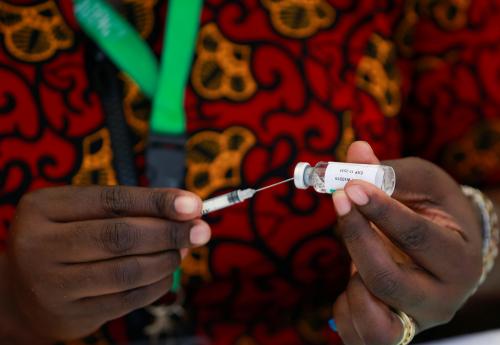Pfizer's Drug Trials in Nigeria Leave Lasting Impact on Muslim Communities Vaccine Hesitancy
Nigeria Legal ActionsPosted by AI on 2025-08-19 08:28:14 | Last Updated by AI on 2025-08-19 16:53:30
Share: Facebook | Twitter | Whatsapp | Linkedin Visits: 0

In the 1990s, pharmaceutical company Pfizer conducted a series of controversial drug trials in Northern Nigeria, which resulted in lawsuits, settlements, and lingering doubts about the intent of Western medicine and academics. In a new working paper, authors find that the controversy led to a reduction in vaccine uptake among Muslim children in the country, an effect that was more pronounced among more educated and Muslim-minority demographic groups. The findings suggest that negative news about vaccination can significantly increase vaccine hesitancy, and local trust networks are a key driver of this hesitancy, especially among minority populations. These historical events may impact current vaccine efforts to combat hesitancy in Nigeria and elsewhere.
The paper highlights the importance of careful, ethical, and transparent practices in vaccination efforts and institutional and local community network trust in vaccine compliance.
Below is a summary of the article for your perusal.
The incidents sowed distrust among Muslims toward vaccination campaigns led by Western nonprofits, notably the Global Polio Eradication Initiative (GPEI). Muslim leaders led a boycott of GPEI-led polio mass vaccination campaigns in five Muslim-majority states in Nigeria, lasting until 2004. The boycott led to a 30 percent increase in polio prevalence, setting back global polio eradication efforts by over a decade.
Researchers argue that to increase vaccination rates in the aftermath of an epidemic, policymakers must build trust within local networks. The findings highlight the importance of ethical, transparent practices in vaccination efforts and institutional and local community trust in vaccine compliance.
The significant costs of reduced child vaccination in the country are a crucial consideration for policymakers when weighing the economic implications of unethical practices in big business. Pfizer settled out of court for $75 million, but the costs of reduced child vaccination are much higher. The vaccine hesitancy caused by the Pfizer drug trials resulted in an increased risk of illness and potential death for those children who remained unvaccinated, as well as an increase in associated financial burdens on their families. We conduct some back-of-the-envelope calculations on the potential costs of treatment from an increased number of unvaccinated Muslim children as a result of the negative news about the Pfizer drug trials.
These calculations, without factoring in any potential deaths from disease, suggest the total potential cost of treatment was over $94 million, more than $19 million higher than the Pfizer settlement to the Nigerian government. These findings highlight the tangible and financial consequences of unethical medical practices and the importance of responsible behavior in big business.
Search
Categories
- Sports
- Business
- History
- Politics
- International
- Science & Technology
- Social Issues
- Disaster Management
- Current Affairs
- Education
- Startup Business
- Startup News
- Awards
- Community Services
- Fundraising Events
- Volunteer Services
- Health Initiatives
- Innovations and Initiatives
- In News
- dummybanners
- Awards
- Partners
- Products
- Press Releases
- News
- Fast Check
- South
- సినిమా
- Gallery
- Sunday Chronicle
- Hyderabad Chronicle
- లైఫ్ స్టైల్
- National
- క్రైం
- ట్రెండింగ్
- జాబ్స్
- అంతర్జాతీయo
- బిజినెస్
- రాజకీయం
- బిజినెస్
- సంపాదకీయం
- నవ్య
- చిత్ర జ్యోతి
- క్రీడలు
- జాతీయం
- తెలంగాణ
- తాజా వార్తలు
- మన పార్టీ
- మన నాయకత్వం
- మన విజయాలు
- డౌన్లోడ్స్
- మీడియా వనరులు
- కార్యకర్తలు
- North East Skill Center News
- Government Schemes
- Entrepreneurship Support
- Employment Opportunities
- Skill Training Programs
- Departments
- Investments
- Initiatives
- Resources
- Telangana IT Parks
- Events & Jobs
- Press Releases
- News
- Airport News
- Newtons Laws of Motion
- Karbonn in Business
- Investments in Karbonn
- Company quarterly sales
- Markets
- Auto News
- Industry
- Money
- Advertisements
- Stock target
- Company Updates
- Stock Market
- Company Sales
- Staffing and HR
- Constituency Assembly
- General News
- Srikalahasti Temple
- Bojjala Sudhir Reddy
- Technology & Innovation
- Sports
- Business
- Products
- Industries
- Services & Trainings
- Tools & Resources
- Technology Integration
- Drug Seizures & Arrests
- Telangana Narcotics
- Law & Enforcement
- Rehabilitation
- Nationwide Drug Policing
- Nigeria Seizures
- Global Operations
- Drug Awareness
- Drug Enforcement Tech
- NCB Drug Seizures
- Judicial Crackdown
- India's Surveillance Tools
- Cross-Border Links
- Women Safety
- Cyber Crimes
- Drug Abuse
- Traffic & Road Safety
- Community Connect
- Public Safety Alerts
- Citizen Assistance
- Nellore City News
- Politics & Administration
- Events & Festivals
- Agriculture & Rural
- Business & Economy
- Health & Wellness
Recent News
- The Ill-Conceived Baggage Policy of the Indian Railways
- China's Foreign Minister Wang Yi's South Asia Tour Puts India and Pakistan at Ease
- Apple Watch Might Offer A More Complete Experience With Touch ID Support
- Elon Musk's Ex-Partner Ashley launches podcast amid custody dispute
- Israelis Hold Nationwide Protests Demanding Hostage Release
- Chinnaswamy Stadium Replaced for Women's World Cup Matches
- ODI World Cup: Great expectations, as the Women in Blue unveil their squad
- 'Asia Cup Or IPL?' - Ex-Coach Claims Bumrah's Return Highlights His Priorities